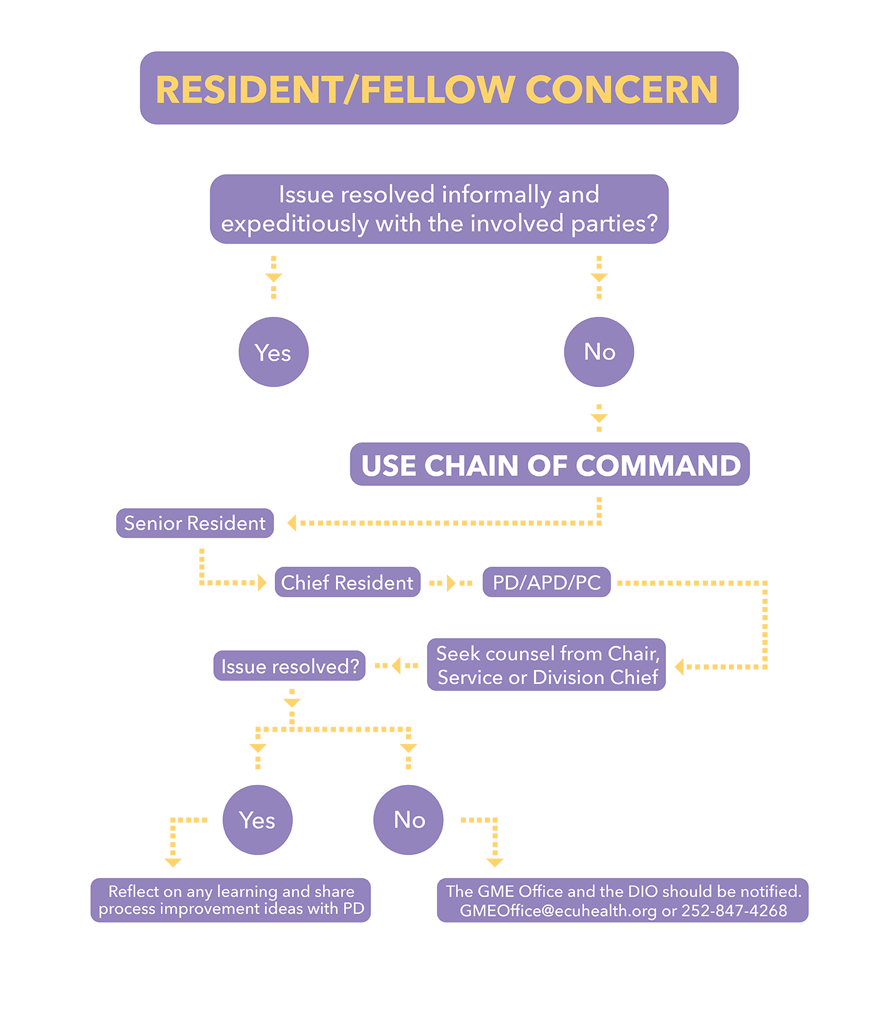Reporting Concerns
Process for Reporting Concerns in the GME Clinical Learning Environment
Purpose: To ensure that Residents have a mechanism through which to express concerns and complaints. These may involve issues relating to personnel, patient care, and program or hospital training environment matters.
On this page, “Resident” refers to both specialty Residents and subspecialty Fellows.
ECU Health Medical Center (ECUHMC)
ECUHMC encourages Resident participation in decisions involving educational processes and the learning environment.
- Such participation should occur in formal and informal interactions with peers, faculty and attending staff.
- Efforts should be made to resolve questions, problems and misunderstandings as soon as they may arise and Residents are encouraged to initiate discussions with the appropriate parties.
- If the issue is not resolved, the following chain of command should be followed. Counsel from the GME Office/DIO may be sought at any time.

Additional Resources
File a SafeNow Report if applicable
From the ECU Health intranet page, click “SafeNow Event Reporting” (found under Resources)
File a Workplace Aggression Report if applicable
From the ECU Health intranet page, click “Report Workplace Aggression” (found under Resources)
ECUHMC Chief of Staff Hotline: or Call 252-847-7000
Executive Dean Feedback tool
Created as part of open and transparent line of communication, to directly communicate with the Executive Dean your thoughts, concerns, ideas and questions based on your experience as part of the Brody family. This spans every area of our school, from education, to patient care, and to workplace satisfaction. To access, use remoteaccess.ecu.edu. While the web-based tool will require you to log in to ensure that only members of the Brody community contribute to the conversation, your feedback can be anonymous if that is your preference and will not be tracked or tied to your identification.
Report to the ECU Ombudsperson
The role of the Ombudsperson is to provide students, residents, and faculty the opportunity to talk with an impartial faculty leader in a confidential fashion about interpersonal difficulties that arise in the teaching-learning environment. The Ombudsperson will provide informal, confidential and impartial support and guidance for students, as well as assisting with the resolution of student mistreatment complaints and other concerns. This is accomplished primarily through listening and asking strategic questions and then offering options for resolution which may include coaching regarding how the student can manage the conflict or serving as a mediator between parties.The Ombudsperson is not part of, and does not take part in, any administrative or formal complaint processes, and reports only to the Dean of the School of Medicine with annual, aggregated and de-identified reports regarding patterns of concern, or individual reports of egregious events that demand immediate attention.
